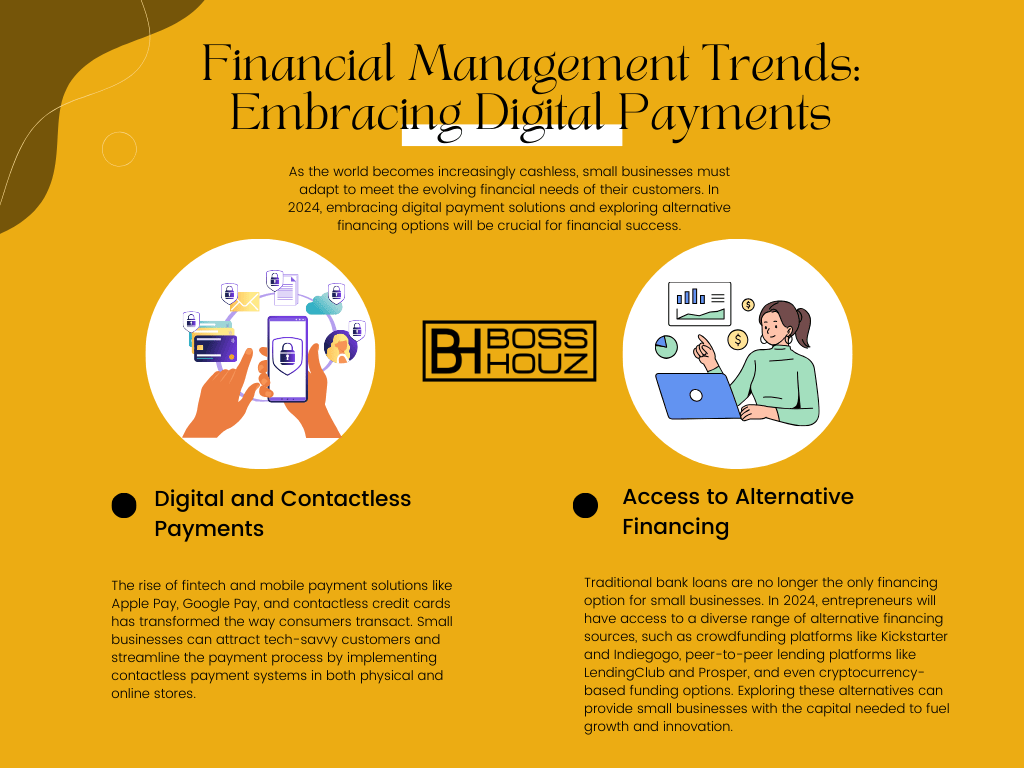As 2024 unfolds, it brings with it a fresh set of opportunities and challenges for small business owners. This year is all about embracing change and making the most of the tools and trends at our disposal. With a focus on innovative solutions and sustainable growth, the business environment is ripe for those ready to take their operations to new heights.
We’re here to guide you through the essential trends that will shape small businesses in 2024. Whether it’s harnessing new technologies or prioritizing green practices, these insights are designed to help you stay ahead in a competitive landscape. Together, we’ll explore how to adapt and thrive, ensuring your business not only grows but excels.
Key Takeaways:
- Embrace e-commerce and optimize for mobile to stay competitive
- Adopt sustainable practices to appeal to eco-conscious consumers
- Leverage AI and automation to streamline operations
- Foster a remote and flexible work environment
- Personalize customer experiences with data-driven insights
- Prioritize cybersecurity and data protection
- Optimize for local SEO and manage online reputation
- Build a brand community and engage in social responsibility
- Identify and capitalize on emerging markets and niches
Table of Contents
1- The Rise of E-commerce: Conquering the Digital Realm
The digital revolution has transformed the way we shop, and small businesses are forced to adapt or risk becoming obsolete. In 2024, the e-commerce juggernaut shows no signs of slowing down, making it imperative for entrepreneurs to establish a strong online presence.
Transitioning to Online Sales
Consumers are increasingly turning to the internet for their shopping needs, and small businesses must embrace this shift. Setting up an online store has become more accessible than ever, with platforms like Shopify, WooCommerce, and BigCommerce offering user-friendly solutions. However, it’s not enough to simply have an online store – businesses must optimize for mobile, as a significant portion of online transactions are now conducted on smartphones and tablets.
Pro Tip: Invest in professional web design and user experience to ensure your online store is visually appealing, easy to navigate, and provides a seamless shopping experience across all devices.
Leveraging Social Media Platforms
Social media platforms like Instagram and TikTok have evolved into powerful marketing tools, allowing small businesses to connect with their target audience and drive sales. Successful brands, such as Gymshark and Dollar Shave Club, have mastered the art of social media marketing, utilizing influencer collaborations, user-generated content, and engaging visuals to build a loyal following and drive sales.
2- Emphasis on Sustainable Practices: Going Green for Growth
As consumers become increasingly eco-conscious, sustainable business practices are no longer a luxury – they’re a necessity. In 2024, small businesses that prioritize sustainability will gain a significant competitive advantage.
Eco-friendly Products and Services
Consumers are actively seeking out businesses that offer environmentally-friendly products and services. From organic skincare lines to plant-based food options, the demand for sustainable offerings is soaring. By incorporating eco-friendly practices into your business model, you’ll not only appeal to conscious consumers but also contribute to a healthier planet.
Sustainable Supply Chains
Building a sustainable supply chain is crucial for small businesses to reduce their environmental impact. This involves sourcing materials from ethical suppliers, minimizing waste, and implementing energy-efficient practices throughout the production process. By embracing sustainability, small businesses can differentiate themselves from competitors while reducing long-term costs and fostering customer loyalty.
3- Adoption of Advanced Technology: Unleashing the Power of AI


In the digital age, small businesses must embrace advanced technologies to stay competitive. The integration of artificial intelligence (AI) and machine learning is no longer a luxury reserved for large corporations – it’s a necessity for efficient operations and data-driven decision-making.
AI and Machine Learning
AI can revolutionize various aspects of small business operations, from improving customer service through chatbots to optimizing supply chain management. Small businesses can leverage AI for predictive analytics, automating repetitive tasks, and gaining valuable insights from data. Tools like IBM Watson, Google Cloud AI, and Amazon AI services offer affordable and accessible solutions for small businesses looking to integrate AI into their operations.
Cybersecurity Measures
As businesses increasingly rely on digital technologies, the risk of cyber threats and data breaches escalates. In 2024, implementing robust cybersecurity measures is crucial for protecting sensitive information and maintaining customer trust. Simple practices like using strong passwords, enabling two-factor authentication, and regularly updating software can go a long way in safeguarding your business from cyber attacks.
4- Remote Work and Flexible Schedules: Redefining the Workplace
The COVID-19 pandemic accelerated the shift towards remote work, and this trend shows no signs of slowing down in 2024. Small businesses that embrace flexible work models can attract top talent, boost employee satisfaction, and reduce overhead costs.
Managing Remote Teams
Effective remote team management requires the right tools and strategies. Collaboration platforms like Slack, Zoom, and Asana enable seamless communication and project coordination. Additionally, fostering a strong company culture through virtual team-building activities and regular check-ins is crucial for maintaining employee engagement and productivity.
Work-Life Balance Initiatives
Offering flexible work schedules and promoting work-life balance can significantly benefit both employees and employers. Initiatives like flexible start and end times, unlimited paid time off, and mental health resources can improve employee well-being, reduce burnout, and ultimately boost productivity and retention rates.
5- Personalization in Marketing: Tailoring Experiences for Success
In an increasingly competitive market, personalization is key to standing out and building lasting customer relationships. By leveraging data and insights, small businesses can create tailored experiences that resonate with their target audience.
Utilizing Data for Custom Experiences
Small businesses can collect and analyze customer data from various sources, such as website analytics, social media interactions, and purchase histories. This data can then be used to create personalized marketing campaigns, product recommendations, and targeted promotions, ensuring that each customer receives a customized experience that speaks directly to their preferences and interests.
Customer Relationship Management (CRM) Systems
Implementing a robust CRM system can streamline the personalization process by centralizing customer data and interactions. Popular options like Salesforce, HubSpot, and Zoho CRM offer affordable solutions tailored for small businesses. Integrating CRM with marketing efforts can enhance lead nurturing, customer segmentation, and ultimately drive sales and customer loyalty.
6- Financial Management Trends: Embracing Digital Payments


As the world becomes increasingly cashless, small businesses must adapt to meet the evolving financial needs of their customers. In 2024, embracing digital payment solutions and exploring alternative financing options will be crucial for financial success.
Digital and Contactless Payments
The rise of fintech and mobile payment solutions like Apple Pay, Google Pay, and contactless credit cards has transformed the way consumers transact. Small businesses can attract tech-savvy customers and streamline the payment process by implementing contactless payment systems in both physical and online stores.
Access to Alternative Financing
Traditional bank loans are no longer the only financing option for small businesses. In 2024, entrepreneurs will have access to a diverse range of alternative financing sources, such as crowdfunding platforms like Kickstarter and Indiegogo, peer-to-peer lending platforms like LendingClub and Prosper, and even cryptocurrency-based funding options. Exploring these alternatives can provide small businesses with the capital needed to fuel growth and innovation.
7- Focus on Local SEO: Dominating the Neighborhood
Having a strong online presence is essential for small businesses to attract and retain local customers. By optimizing for local search and managing online reputation, entrepreneurs can establish themselves as a go-to choice in their community.
Optimizing for Local Searches
Local SEO involves optimizing your website, online listings, and content to rank higher in location-based searches. Tactics like claiming and updating your Google My Business listing, incorporating local keywords, and generating locally-relevant content can significantly improve your visibility in local search results.
Managing Online Reviews and Reputation
Online reviews can make or break a small business’s reputation, and managing them effectively is crucial. Encourage satisfied customers to leave positive reviews on platforms like Google, Yelp, and Facebook. When faced with negative reviews, respond promptly and professionally, addressing concerns and offering solutions. Consistently monitoring and managing your online reputation can help build trust and attract new customers in your local area.


8- Community Engagement and Social Responsibility: Building Loyalty
In terms of social media and conscious consumerism, small businesses must go beyond just selling products or services. Building a strong brand community and engaging in corporate social responsibility (CSR) initiatives can foster loyalty, attract purpose-driven customers, and ultimately drive sustainable growth.
Building a Brand Community
A strong brand community can serve as a powerful marketing tool for small businesses. By creating a space for customers to connect, share experiences, and engage with your brand, you can foster a sense of belonging and loyalty. Platforms like Facebook Groups, Discord servers, and online forums can facilitate community-building efforts, while user-generated content and influencer collaborations can amplify your brand’s reach.
Corporate Social Responsibility (CSR)
In 2024, consumers will increasingly prioritize businesses that align with their values and contribute positively to society. Small businesses can implement CSR initiatives by supporting local charities, promoting environmental sustainability, or investing in employee development programs. By showcasing your commitment to social responsibility, you can enhance your brand perception, attract conscious consumers, and ultimately build a loyal customer base.
9- Emerging Markets and Niches: Staying Ahead of the Curve
As things evolve, new markets and niches emerge, presenting opportunities for savvy entrepreneurs to get a head start on the competition. In 2024, identifying and capitalizing on these emerging trends will be crucial for small business success.
Identifying and Capitalizing on New Trends
Staying ahead of the curve requires continuous market research and trend analysis. Monitor industry publications, attend relevant events, and engage with your target audience to identify emerging consumer needs and preferences. Once you’ve identified a promising niche or trend, act quickly to establish yourself as a pioneer in that space.
Strategies for Becoming an Early Adopter
Being an early adopter in a new market or niche can provide significant advantages, such as reduced competition, the ability to shape consumer perceptions, and the potential for rapid growth. To capitalize on this opportunity, small businesses should prioritize agility, innovation, and a willingness to take calculated risks. Continuously adapting your products, services, and marketing strategies to align with emerging trends can help you stay ahead of the curve and solidify your position in the market.
Embracing the Future with Boss Houz
The small business landscape of 2024 is a dynamic and ever-changing frontier, with trends reshaping the way we operate, market, and engage with customers. From the integration of cutting-edge technologies to the rise of sustainable practices, these trends are redefining the rules of the game.
At Boss Houz, we understand the challenges and opportunities that these trends present, and we’re committed to equipping small business owners with the knowledge and resources they need to thrive. Our team of experts specializes in navigating the complexities of the modern business world, offering tailored solutions and practical guidance to help you stay ahead of the curve.








